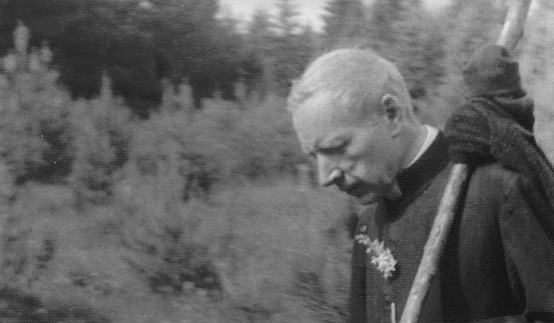Father and Shepherd #5 | Wartime exile


fot. Instytut Prymasowski Stefana Kardynała Wyszyńskiego
Cardinal Stefan Wyszyński the Primate of Poland has remained in the memory of Poles as a statesman, defender of faith and freedom of the homeland, advocate of unconditional human dignity.
Shortly after the outbreak of World War II, Karol Radoński, bishop of Włocławek, sent Rev. Professor Wyszyński with several priests and students of the 6th year of the Włocławek seminary to the east in the hope that the war would not get there so soon and they would be able to finish their seminary studies and prepare for priestly ordination . When they arrived in Lublin, it turned out that the city had been bombed a few days earlier. There was no question of staying there. They drove further east. They reached Lutsk in Volhynia. There they were surprised by the news that Poland was occupied by the Red Army from the east.
After returning to Włocławek, it turned out that he was on the list of people wanted by the Gestapo by name. Blessed Bishop Michał Kozal gave the order that he was to leave Włocławek immediately. Just after The departure of Fr. Wyszyński, the Germans arrested Bishop Kozal and many clergymen, took them to the camp in Dachau, and seized the seminary buildings and turned them into a war hospital.
Fr Wyszyński first went to his family home, to Wrociszew. The exile of the war began. After some time, Father Korśmieowicz brought him to Kozłówka, where he was a chaplain in the Zamoyski estate. Then he went to Żułów, to the house of the Franciscan Sisters, Servants of the Cross. He also served the local population, catechized children, and supported partisans. The next place of Father Wyszyński’s stay was Laski near Warsaw. Here he was the chaplain of the Franciscan Sisters Servants of the Cross and the Institute for the Blind Children. He was active in the underground resistance under the pseudonym Radwan III. He was also the chaplain of the war hospital. Here he encountered the cruelty of war up close. Young soldiers looked for support in it. Brave at the front, they were like children in suffering. They asked him to be present during surgery. He fulfilled their requests and strengthened their spirits. He walked in the woods, collected the wounded, and heard confessions of the soldiers in the trenches. Once he found a girl injured in the leg. The wound was very deep. She had to wear a tourniquet. He carried the girl on his back and transported her to a war hospital. Years later, she came to thank him for saving his life.
In Laski, he met a group of girls from the so-called Eight. There were eight students, headed by Maria Okońska, who wanted to create the “City of Girls” educational centre with Fr. Wyszyński. This was the beginning of one of the first secular institutes in Poland. During the communist period it was not possible to implement the idea of the “City of Girls”. The members of the Eight devoted their lives to help Father Wyszyński when God made him responsible for the Church in Poland.
After the end of the war, he returned to Włocławek. He was entrusted with the task of organizing a seminary. The seminary building in Włocławek, had been turned into a hospital, and required renovation. The beginnings of the seminary were in the parish in Lubraniec.
On 25th March 1946, Cardinal August Hlond called Father Wyszyński to Poznań and informed him of the will of the Holy See that he was to be the ordinary of the Lublin diocese.
Father and Shepherd #1 | Childhood >>>
Father and Shepherd #2 | Seminary and priestly ordination >>>
Father and Shepherd #3 | The beginning of priestly ministry >>>
Father and Shepherd #4 | Among the workers in Włocławek >>>





Dodaj komentarz